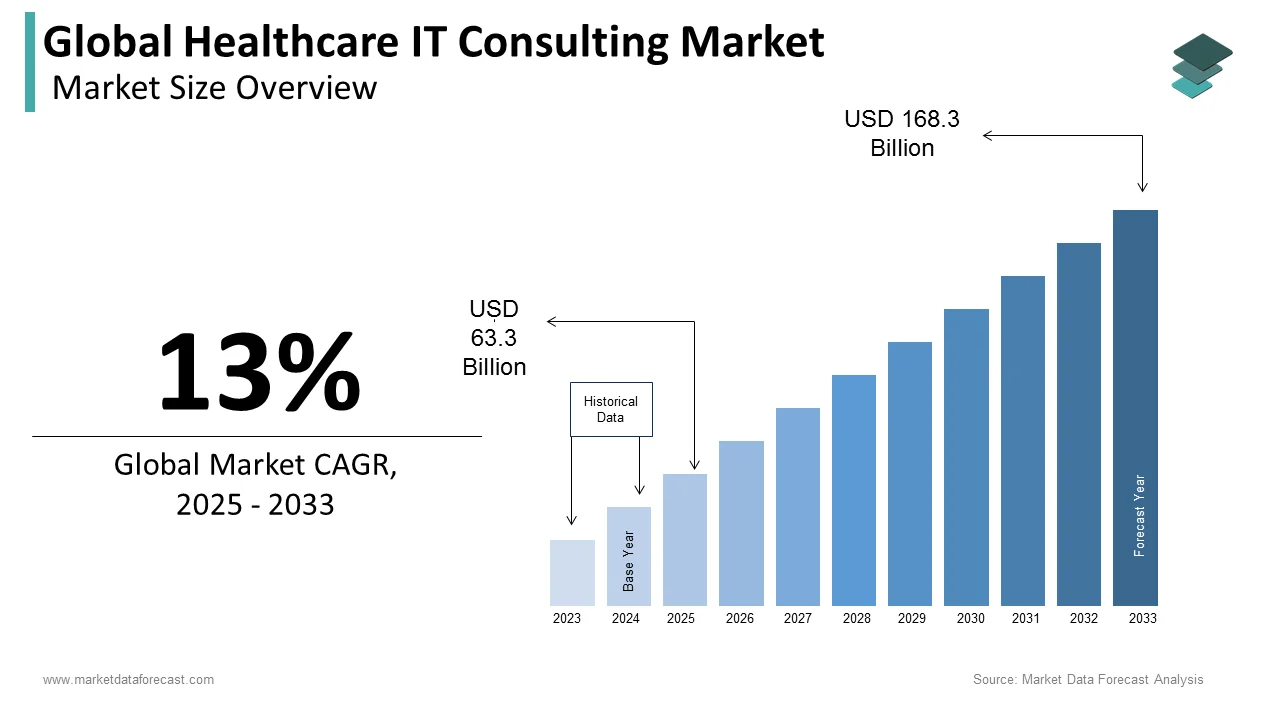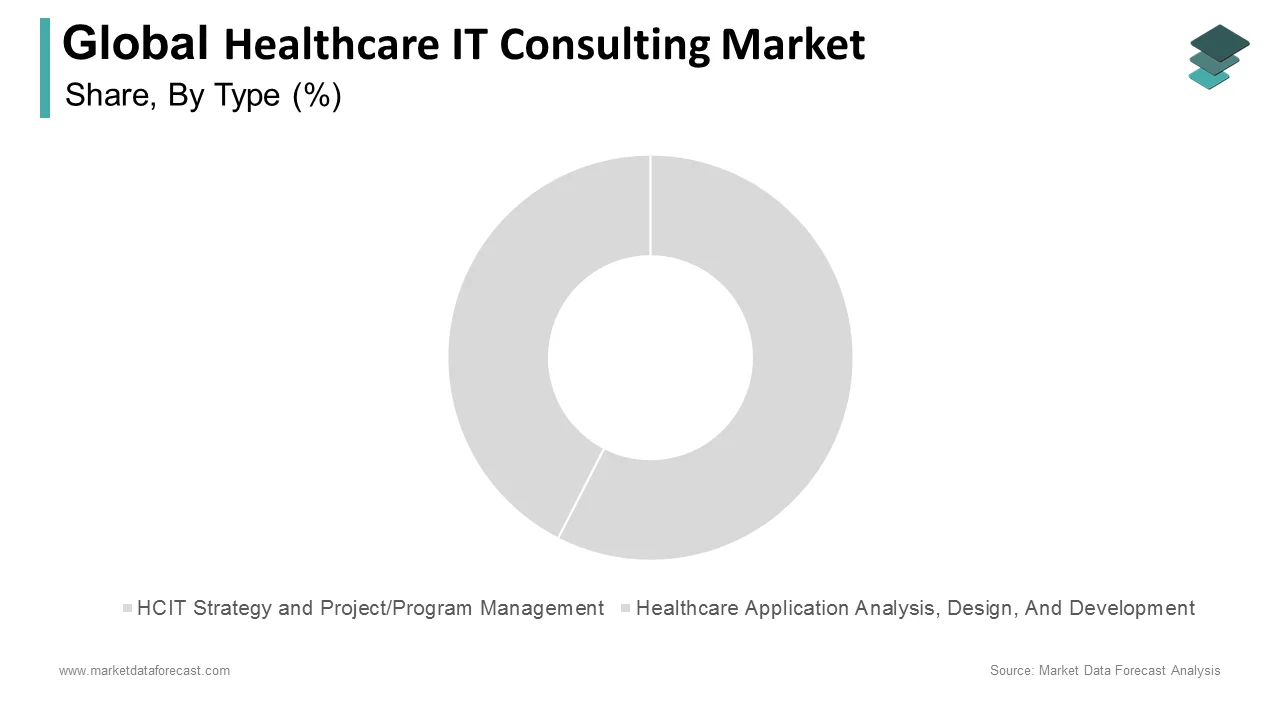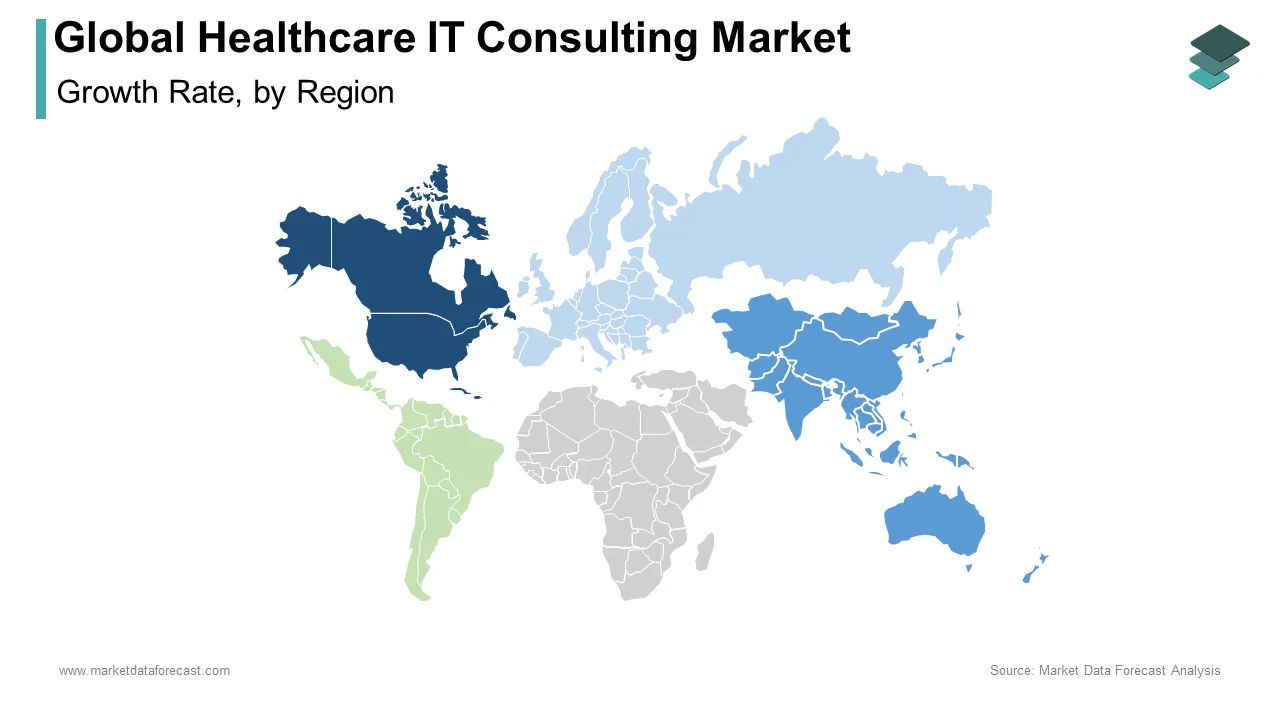Global Healthcare IT Consulting Market Size, Share, Trends & Growth Forecast Report By Type, End-user, and Region (North America, Europe, Asia-Pacific, Latin America, Middle East and Africa), Industry Analysis From 2025 To 2033.
Global Healthcare IT Consulting Market Size
The global healthcare IT consulting market was worth US$ 56.02 billion in 2024 and is anticipated to reach a valuation of US$ 168.3 billion by 2033 from US$ 63.3 billion in 2025, and it is predicted to register a CAGR of 13% during the forecast period 2025-2033.

Healthcare organizations, including providers and payers, are always attempting to achieve three key objectives through healthcare consulting: improve the patient care experience, optimize health outcomes, and minimize healthcare costs. Healthcare consulting is the practice of sharing knowledge, providing guidance, and assisting healthcare companies in making business decisions that benefit their customers and patients. Healthcare consultants are industry specialists with the education and experience in healthcare legislation, rules, and policies to assist medical organizations and hospitals in running their companies efficiently and successfully. Healthcare IT consulting services assist healthcare companies in overcoming weak or low-level healthcare IT skills and supporting the successful use of technology in the healthcare setting to run their businesses efficiently and effectively. Healthcare IT consulting services assist healthcare businesses in overcoming weak or low-level healthcare IT skills and implementing digital healthcare projects effectively. Healthcare IT consulting services help hospitals, clinics, practices, assisted living facilities, labs, and other healthcare organizations to help them implement complex digital initiatives, provide digital patient care, optimize internal processes, and improve IT infrastructure, among other things. Financial planning, operations management, feasibility studies, strategic planning, marketing strategy, business reports, branding, HR planning, hospital software, and infrastructure are some of the most common healthcare IT consulting services planning and facility planning.
MARKET DRIVERS
Y-O-Y growth in the adoption of digital technologies increase the demand for the global healthcare IT consulting market
The increasing usage of digital technologies primarily drives the market for healthcare IT consulting. With the help of information technology, infrastructure management, IT security services, and cloud-based services, hospitals and medical facilities are adopting digital practices. According to the World Health Organization, only around half of upper-middle- and high-income nations have established national EHR systems. Adoption rates in the lower-middle-income countries are substantially lower, at 35 %, than in low-income countries, at roughly 15 %. According to Statista, e-prescriptions account for 84 % of all prescriptions in the United States by 2020. While 46 % of surveyed health care providers (hospitals and clinics) utilize live videoconferencing, and 41% use RPM to deliver care, according to the Vidyo Telehealth Adoption Survey 2019. This strong IT support combined with agile approaches gives healthcare providers a competitive edge in improving quality, reducing costs, increasing profitability, and simplifying inventory management. Hence many healthcare facilities hire healthcare consultants for the easy process of IT technologies. As a result, the market for healthcare IT consulting market is growing.
The initiative taken by the market participants and the government are further driving the global healthcare IT consulting market.
The healthcare IT consulting market is also driven by strategic initiatives taken by enterprises and the government. Healthcare IT has piqued the interest of investors and organizations during the last decade, leading governments and organizations to take action and invest in the field. For example, The National Coordinator for Health Information Technology (ONC) offers $2 million in support to improve interoperability, and LEAP in Health Information Technology seeks to resolve the advancement and testing of data sharing to advance clinical care, research, and improved patient outcomes. Similarly, according to the article published by “The Economics Times,” since 2015, the government can consult doctors through video links. Also, healthcare and Government has implemented various laws like The Medicare Access and CHIP Reauthorization Act, The Health Information Technology for Economic and Clinical Health (HITECH) Act, and The Health Insurance Portability and Accountability Act (HIPAA) to advance interoperability, clarify HIPAA privacy rules, and support substance abuse and mental health services. This effort increases the adoption rate of healthcare IT systems, increasing the demand for healthcare IT consulting.
MARKET RESTRAINTS
The healthcare IT consulting sector may be hampered by high costs and a lack of knowledge. Some hospitals cannot afford the cost structure of the healthcare IT system. Even if they apply these technologies, the expense of engaging a specific healthcare consultant exceeds their budget, forcing the hospital to look for other options. Furthermore, because healthcare IT is a new field, there are fewer experts with comprehensive understanding. As a result, many hospitals choose alternatives to hiring a person or organization. As a result, the need for healthcare IT consulting has held steady.
REPORT COVERAGE
|
REPORT METRIC |
DETAILS |
|
Market Size Available |
2024 to 2033 |
|
Base Year |
2024 |
|
Forecast Period |
2025 to 2033 |
|
CAGR |
13% |
|
Segments Covered |
By Type, End-user, and Region. |
|
Various Analyses Covered |
Global, Regional, and country-level analysis; Segment-Level Analysis, DROC; PESTLE Analysis; Porter’s Five Forces Analysis, Competitive Landscape; Analyst Overview of Investment Opportunities |
|
Regions Covered |
North America, Europe, APAC, Latin America, Middle East & Africa |
|
Market Leaders Profiled |
Epic Systems Corporation, General Electric, Koninklijke Philips N.V., Cerner Corporation, Cisco, Cognizant, Genpact, Allscripts Healthcare, LLC, Atos SE, HCL Technologies Limited, Hexaware Technologies, Infor, IBM Corporation, Deloitte Touche Tohmatsu Limited, Accenture, Infosys Limited, Larsen & Toubro Limited, Microsoft, Mckesson Corporation, Ntt Data, Inc., Oracle, Sap SE, Tata Consultancy Services Limited and Wipro Limited, and Others. |
SEGMENTAL ANALYSIS
By Type Insights

Based on the type, during the forecast period, the Healthcare Application Analysis, Design, and Development segment are predicted to grow faster. The fact that IT application analysis, design, and development constitute a key component of all IT solution implementation projects accounts for the large share of this market. Furthermore, each healthcare institution has unique needs that necessitate thorough planning, development, and implementation of customized solutions.
By End-User Insights
Based on End-User, the healthcare IT consulting market is likely to be dominated by the Healthcare Providers segment. The increased acceptance of HCIT solutions by providers as a method of lowering costs, as well as the growing acceptance of electronic medical records (EMRs) to improve patient care, increasing hospital consolidation, changing and tightening HCIT provider regulations, and expanding usage of HCIT solutions by ACCs, Home Healthcare Centers, and Diagnostic Centers are all contributing to this segment's substantial share.
REGIONAL ANALYSIS

Geographically, the North American market is predicted to have a large share of the market. Changes in laws and Medicare payments have contributed to the expansion, and healthcare providers are increasingly reliant on IT healthcare consulting companies. The expanding number of healthcare-related businesses, combined with the increasing number of clinical trials for newer drugs and rapid advancements in the field of medical pharmaceuticals and equipment, has produced a tremendous need for healthcare consulting services in North America. CitiusTech, with its technological skills, provides medical technology with services for upgrading current enterprise applications (EMR) to end-to-end support in the United States. In addition, Healthcare IT consulting organizations assist patients and caregivers by assisting with care delivery and reducing costs.
Due to expanding demand for healthcare consulting services for effective delivery of healthcare services, a growing number of mergers and acquisitions among healthcare businesses, and a growing need to reduce healthcare costs, Europe was the second biggest regional healthcare consulting services market. Germany, the United Kingdom, and France are all key players in the European healthcare consulting services market.
The Asia Pacific healthcare consulting services market is expected to grow rapidly during the forecast period, leading to providers' increased focus on meeting patient demands. This is due to technology advancements, global pharmaceutical companies investing in the region, and a rise in rural demand for remote treatment and telemedicine. In addition, the Asia Pacific market will benefit from the developing healthcare systems in rising nations such as Japan and India and the inclusion of advanced technologies.
KEY MARKET PLAYERS
The key players operating in the healthcare IT consulting market include Epic Systems Corporation, General Electric, Koninklijke Philips N.V., Cerner Corporation, Cisco, Cognizant, Genpact, Allscripts Healthcare, LLC, Atos SE, HCL Technologies Limited, Hexaware Technologies, Infor, IBM Corporation, Deloitte Touche Tohmatsu Limited, Accenture, Infosys Limited, Larsen & Toubro Limited, Microsoft, Mckesson Corporation, Ntt Data, Inc., Oracle, Sap SE, Tata Consultancy Services Limited and Wipro Limited among others.
RECENT HAPPENINGS IN THE MARKET
- On 13 April 2021, Damo Consulting, a leading digital transformation and growth advisory business for healthcare businesses and technology companies, has launched DigiMTM, an online assessment tool for health systems wishing to benchmark their digital transformation initiatives.
- On 27 October 2020, Accenture has acquired OpusLine, a leading consultancy firm based in Paris. As a result, Accenture would be better positioned to supply health sector clients with the newest breakthroughs in data analytics and artificial intelligence (AI) following the purchase of OpusLine and support the health ecosystem with highly differentiated services.
MARKET SEGMENTATION
This research report on the global healthcare IT consulting market has been segmented and sub-segmented based on type, end-user, and region.
By Type
- HCIT Strategy and Project/Program Management
- Healthcare Application Analysis, Design, And Development
- HCIT Integration and Migration
- HCIT Change Management
- Healthcare/Medical System & Security Set-Up and Risk Assessment
- Healthcare Enterprise Reporting and Data Analytics Services
- Production Go-Live/Post Go-Live Support
- Healthcare Business Process Management
- Regulatory Compliance
- Others Consulting Services
By End-User
-
Healthcare Providers
-
Hospitals, Physician Groups, and IDNs
- Ambulatory Care Centers
- Home Healthcare Agencies, Nursing Homes, And Assisted Living Facilities
- Diagnostic and Imaging Centers
- Other End Users (Pharmacies and Diagnostic & Pathological Laboratories)
-
- Healthcare Payers
- Private Payers
- Public Payers
- Other End Users
By Region
- North America
- Europe
- Asia-Pacific
- Latin America
- The Middle East and Africa
Related Reports
Access the study in MULTIPLE FORMATS
Purchase options starting from $ 2500
Didn’t find what you’re looking for?
TALK TO OUR ANALYST TEAM
Need something within your budget?
NO WORRIES! WE GOT YOU COVERED!
Call us on: +1 888 702 9696 (U.S Toll Free)
Write to us: sales@marketdataforecast.com
